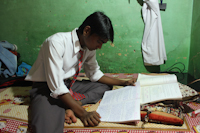The Price of Success: Are Parents Stealing their Children's Childhoods?

In our current generation, many students, especially Indian students, experience copious amounts of pressure to succeed and do well. The academic atmosphere has become plagued by competition, which translates into more pressure to succeed and surpass fellow colleagues. This echoes in all aspects of life and affects people of all ages, predominantly in a negative way. There is too much pressure to achieve this success in our society and it is the young that bear all the weight. This pressure, often very dangerous, starts at a very young age when parents begin to bombard their children with the question, “What will you become when you grow up?”
After the initial question come the leading questions: “Will you become a doctor or an engineer, how will you provide for your family?” As children grow up, they are repeatedly exposed to role models and are required to meet expectations that limit their choices at a very young age. Limiting kids’ childhoods instills in them premature notions about what they “want” to be when they grow up. These expectations at an early age affects them emotionally.
Fear
“It’s scary how that kid seems to know exactly what he wants to do in life.” This quote, recorded in an interview between an American-Indian child and a reporter provides a clear depiction of this phenomenon. Once the child has a goal in mind, a fear of failure sets in. Although this fear of failure can be effective in helping the kids achieve material success, it can destroy them internally. This fear of failure found very often in Indian and Asian students has been positively correlated with an increase in depression and the number of suicides.
A recent news report examined suicide data in India’s top universities, the prestigious Indian Institutes of Technology, and found that suicide rates had risen over the past four years. This provides a striking example of how pressure is eating away at the youth of India. The report indicated that the pressure of finding a well-paying job, obtaining a high college GPA, and dealing with demanding parents causes tremendous amounts of stress in students. The incredibly competitive learning environment has only amplified the stress because students feel like it’s their obligation to transcend their fellow colleagues in academics. Of course this is not always possible. Not everyone can be the top student and some students will inevitably experience failure. Unfortunately, when these kids receive a “D”, they believe that they have not only let down themselves, but also their parents. To address this issue, First Lady Michelle Obama recently visited high schools in India and China to help counter the growing pressure. She expressed great concern with the current situation of education in these countries and offered powerful advice:
“your education is for you, don’t let others influence your life.”
Education shouldn’t be a leading cause of suicides; education should be a positive force that betters one’s own life. Unfortunately, many have yet to understand this..
Who’s to Blame?
Parents are often the primary proponents of this pressure since they are the ones who expose their children to influences from an early age. Many parents know the harmful effects of pressuring their kids, but then why do they place so much pressure on their children to succeed? Apart from the obvious answer that parents desire the best for their children, Tanya Luhrmann, an anthropologist at Stanford University, explains that another factor that might play a role in motivating parents are social websites such as Facebook.
How? Through these websites, an existing factor has been amplified: social comparison. The world is now interconnected and there is no hiding what one is doing. This pushes people to display their accomplishments and achievements. Luhrmann calls this the “pressure of performance.” For parents (very often Indian parents), this can be something of the nature of wanting to say that “my kid got into Harvard!” Such an achievement would obviously place the parent higher on the “social ladder” and would provide them with a lot to talk about in their next social interaction. However, climbing this ladder translates into burdening a child to succeed beyond reasonable expectations.
It turns out that our sense of social rank – where you draw a line on an abstract ladder to show where you are with respect to others – has influenced many parents to increase the already high amount of pressure on their child. With child after child falling victim to depression and suicide due to the pressure placed on them to succeed, we must raise the question, “is our social rank as important as the mental health of our children?”
Moving Forward
Success and pressure are intrinsically linked. With the amplification of the social comparison factor via social networking sites, the amount of pressure being placed on a child has dramatically increased. With parents feeling the “pressure of performance” in their virtual world and children feeling the pressure to succeed, there is no telling how much the situation can spiral out of control. The only way we can break out of this downwards spiral is to follow Michelle Obama’s advice and understand that our education is for ourselves, and not for impressing anyone else.
[Image Attribute: Fairmail]




